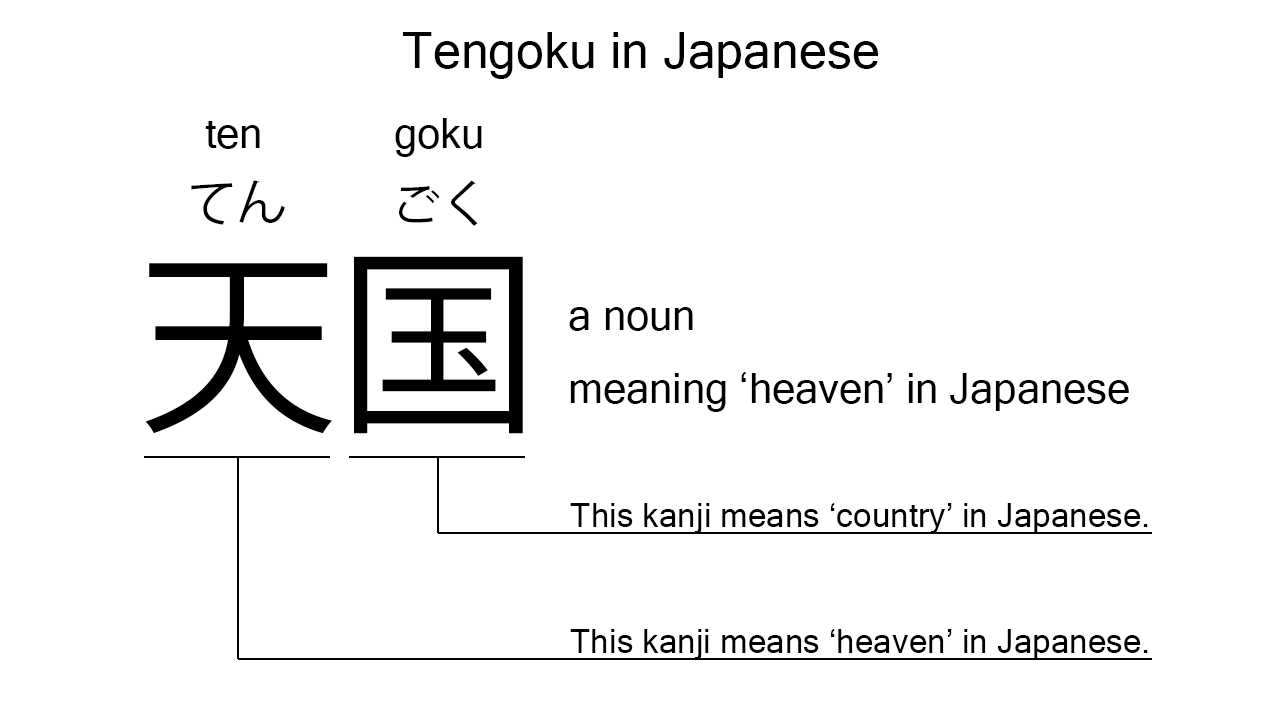What does “tengoku” mean in Japanese?
Native speakers use tengoku to mean ‘heaven’ in Japanese. Perhaps, some Japanese learners know this word as it is sometimes used in Japanese movies, songs, novels, manga, anime, and the like. In this blog post, however, I will explain this word in detail based on its kanji expression. And also, I will explain how to use it through example sentences. My explanations would help Japanese learners understand tengoku more clearly. Then, let’s get started!
Contents
Definition and meaning of “tengoku”
Let me start with the definition and meaning of tengoku.
- tengoku – 天国 (てんごく) : a noun meaning ‘heaven’ in Japanese.
Normally, Japanese native speakers use this noun to refer to the place where they go after they die. It’s also worth mentioning here that they sometimes use this to refer to places like heaven. So, its usages are similar to those of the English noun, heaven, I think.
The definition and meaning are simple and clear. To understand this noun more clearly, however, let me explain its kanji characters in detail, one by one.
Japanese kanji for heaven
The Japanese kanji expression for heaven consists of the following two kanji characters:
- 天 : a kanji character used to mean ‘heaven’ or ‘sky’ in Japanese.
- 国 : a kanji character used to mean a ‘country’ in Japanese.
From these two kanji characters, we can understand that tengoku literally means a ‘heaven country’ in Japanese. This literal interpretation is not completely in line with the actual meaning, but still very close, I think.

When we meet new kanji expressions, we should check their kanji characters in detail to understand their meanings clearly and deeply. In many cases, kanji characters tell us a lot about the meanings of the expressions they form. Actually, here, we could get the better understanding of tengoku through the detailed kanji check above.
So far, I’ve explained the definition and meaning of tengoku together with its kanji characters. Then, let me explain how to use it through the example sentences below.
How to say “heaven” in Japanese
boku tachi wa tengoku wo shinjiru – 僕達は天国を信じる (ぼくたちはてんごくをしんじる)
We believe in heaven.
Below are the new words used in the example sentence.
- boku – 僕 (ぼく) : a pronoun meaning ‘I’ in Japanese. This is used mainly by boys and young males.
- tachi – 達 (たち) : a suffix used after a noun or pronoun to make its plural form. In the example, this is used after boku to make its plural form, boku tachi, which means ‘we’ in Japanese. Learn more about Japanese plural.
- wa – は : a binding particle working as a case marker or topic marker. In the example, this works after boku tachi to make the subject in the sentence.
- wo – を : a case particle used to make the object word in a sentence. In the example, this is used after tengoku to make the object in the sentence.
- shinjiru – 信じる (しんじる) : a verb meaning ‘to believe’ in Japanese.
This is a typical usage of tengoku. In this example, it works as a part of the commonly-used phrase, tengoku wo shinjiru, which means ‘to believe in heaven’ in Japanese.
Another example of “tengoku”
koko ga tengoku desu ka – ここが天国ですか (ここがてんごくですか)
Is this heaven?
Below are the new words used in the example sentence.
- koko – ここ : a pronoun used to refer to a place close to the speaker. In the example, this is used to mean ‘this’ in Japanese.
- ga – が : a case particle used to make the subject word or the object word in a sentence. In the example, this is used after koko to make the subject in the sentence.
- desu – です : an auxiliary verb used after a noun or adjective to make it polite. Probably, this is well known as a part of Japanese desu form. In the example, this is used after tengoku to make it sound polite.
- ka – か : a sentence-ending particle used to make a question. As the definition suggests, this is used at the end of the example sentence to make the question.
This is another example of tengoku. When we want to mean ‘heaven’ in Japanese, anyway, this noun is always a very good option.
Summary
In this blog post, I’ve explained the definition and meaning of tengoku in detail based on its kanji expression. And also, I’ve explained how to use it through the example sentences. Let me summarize them as follows.
- tengoku – 天国 (てんごく) : a noun meaning ‘heaven’ in Japanese. These two kanji characters literally mean a ‘heaven country’ in Japanese. This literal interpretation is not completely in line with the actual meaning, but still very close, I think. Normally, Japanese native speakers use this noun to refer to the place where they go after they die. It’s also worth mentioning here that they sometimes use this to refer to places like heaven. So, the usages of this noun are similar to those of the English one, heaven, I think.
Hope my explanations are understandable and helpful for Japanese learners.
Leave a Reply